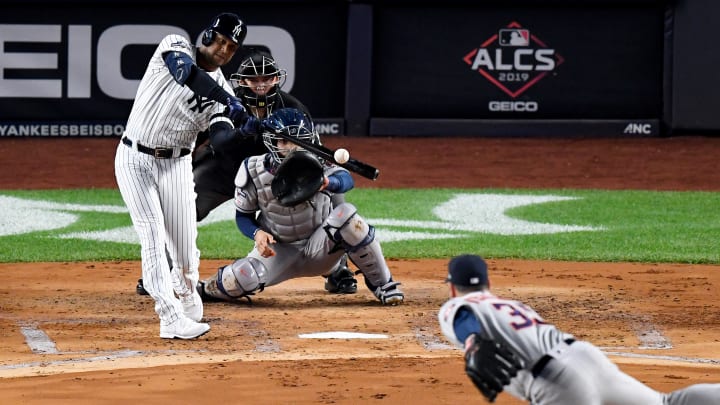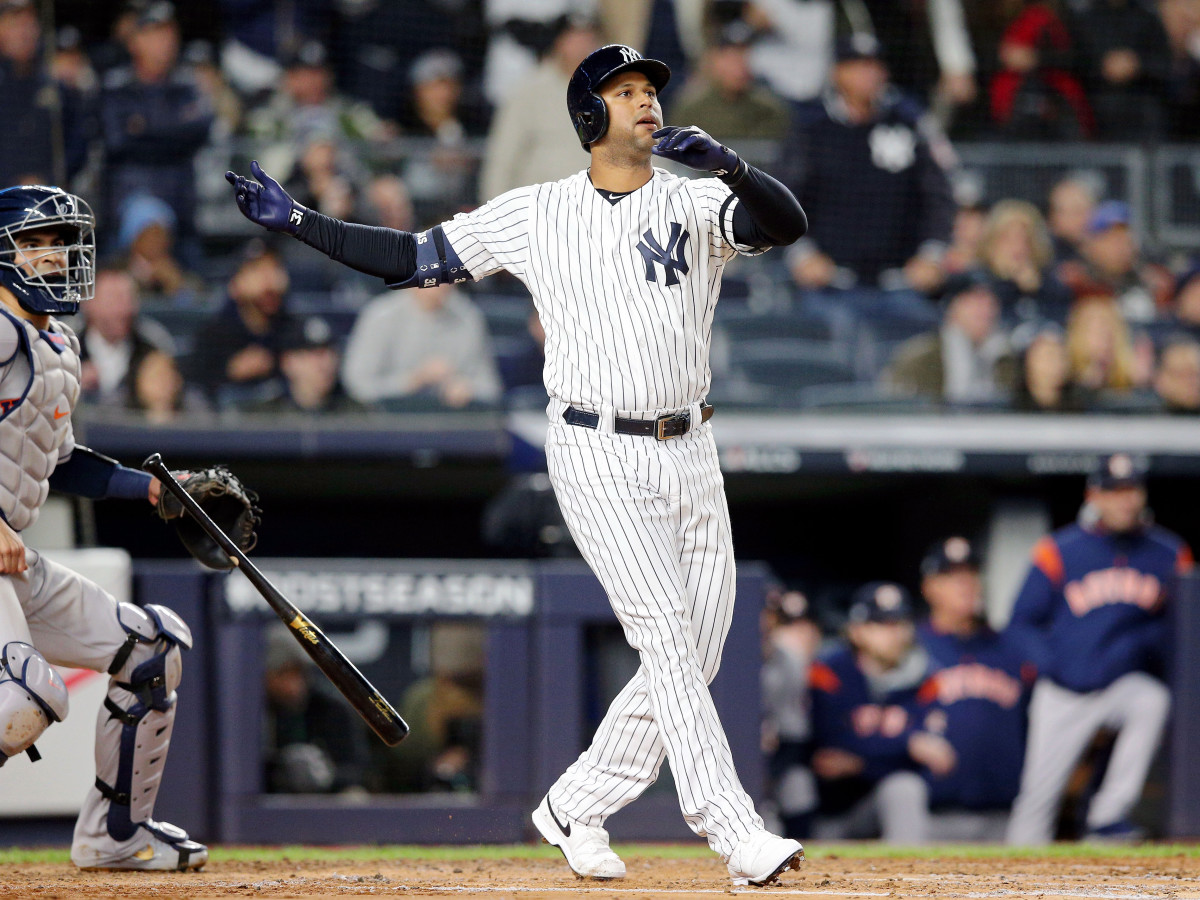Aaron Hicks' Season-Saving Home Run Comes Less Than 3 Months After Season-Ending Injury


NEW YORK — For an instant on Friday night, Aaron Hicks was the only person in the world who knew what he had done. We all understand now that his first-inning home run turned a tied Game 5 of the ALCS into a 4–1 lead that would become the final score, that he gave his teammates the first deep breath they’d had in days, that he extended the Yankees’ season by at least a day. But for those half-dozen heartbeats, all anyone else could tell was that he had hit a misplaced Justin Verlander slider very hard toward the rightfield corner. No one else knew whether it would stay fair.
In the first-base dugout, New York manager Aaron Boone stayed perched on the second step. He did not watch the ball. He watched the player. The player always tells you. Aaron Hicks knew it would stay fair. So then Aaron Boone knew, too.
Hicks dropped his bat. He stood still. He stalked down the first-base line. He did not begin running until 3.9 seconds after ball exploded off bat, when the rest of us finally learned: It clanged off the yellow foul pole. Home run.
The blast changed everything. The most prolific regular-season offense had scored six times in the past three games, as New York dug itself into a three-games-to-one series hole. The Astros seemed poised to pour champagne all over the visiting clubhouse. Yankees hitters looked lost. They began pressing. Pitchers began counting on themselves to hit each spot. But after Hicks’s home run, they could all exhale. Starter James Paxton could pitch aggressively. Boone could steal an extra inning from him and preserve his relievers for Saturday’s bullpen game.

Only 20 other men have homered off Verlander in the postseason, only two others in win-or-go-home games. Hicks is the first to do it while playing in his fourth game in almost three months.
Was he nervous? Outfielder Cameron Maybin laughed at the question. “If you’re scared, get a dog,” he said. “Right now ain’t no time to be nervous.”
Six weeks ago, Hicks thought his season was over. He had hurt the flexor tendon in his right elbow in early August. Doctors recommended rest, and if that didn’t work, Tommy John surgery. “It was the worst thing to hear,” Hicks recalled after Game 5.
Hicks went home to Phoenix, anguished, to begin his forced respite. It didn’t last long. A friend came to visit and wanted to hit in Hicks’s batting cage. As Hicks went to set up, he realized that his arm felt good. Doctors’ orders be damned, he decided to partake in a little light catch. He felt OK. He tried again and sent footage to assistant athletic trainer Michael Schuck, who sent it to his boss, Steve Donohue.
Donohue called GM Brian Cashman.
“Get him to Tampa,” Cashman said.
Hicks got on a plane and began working out at the Yankees’ spring training facility, six hours a day of batting practice and defensive drills. He worked in the cage and hit against pitchers at stay-hot camp, where teams send players who might be needed in the postseason. He communicated regularly with teammates and coaches. I’ll be ready for the ALCS, he insisted. And sure enough, when New York released its series roster, there was Hicks, under outfielders. The player always tells you.
Still, Boone waited. He did not start Hicks in Game 1. He did not start him in Game 2, against Verlander. “It’s a tough first game back draw,” the manager explained. Hicks pinch-hit in the 10 inning that night. He grounded out to first. But he got the start the next night, against Cy Young candidate Gerrit Cole, and produced the team’s two best plate appearances, a pair of walks. Hicks wondered about regaining his timing after the layoff, but he never wondered about his eye. “Aaron Hicks–type plate appearances,” Boone likes to call them. Hicks walked two more times in Game 4.
And then came Game 5, an elimination game against a man who led the league in strikeout-to-walk ratio (7.14) and walks and hits per innings pitched (0.803), a man who throws 95 in the first inning and 98 in the eighth, a man who will certainly own a plaque in Cooperstown one day. He had baffled the Yankees in Game 2. He has almost no weaknesses.
But there is one, and all week the Yankees agreed that they would exploit it in Game 5: Verlander is at his worst in the first inning. He sometimes comes out amped up and overthrows. This is not much of a gift—hitters have compiled only a .213 average against him in that frame—but it’s something.
So when Verlander missed over the plate with a fastball to first baseman DJ LeMahieu, LeMahieu did not wait for a second chance. He deposited it in the bleachers. Three pitches later, rightfielder Aaron Judge pulled an outside fastball to leftfield. Three pitches after that, Verlander left a curveball up. Second baseman Gleyber Torres lined it into the leftfield corner. DH Giancarlo Stanton struck out, making the Yankees 0 for their last 16 with runners in scoring position.
Aaron Hicks' three-run homer gives the Yankees a 4-1 lead after the first, and Yankee Stadium is rocking
— SI MLB (@si_mlb) October 18, 2019
(via @MLBONFOX) pic.twitter.com/fxEwLQ5i4v
Hicks walked to the plate. The first two strikes—a curveball and a slider—seemed to fly by him. Slow down, he told himself. He breathed. The next three were high fastballs. He saw them well.
Suddenly he felt sure of his timing. He could spot whatever came next. It was a slider.
He swung.
